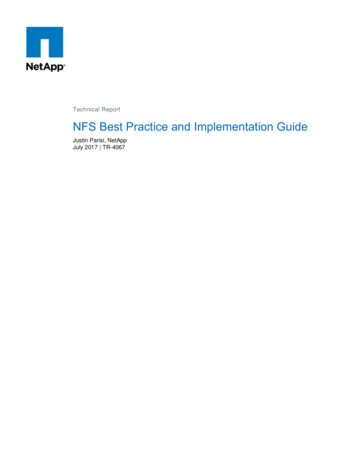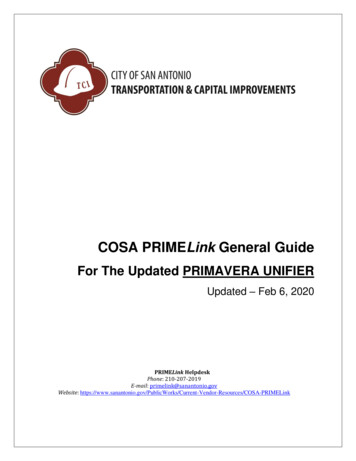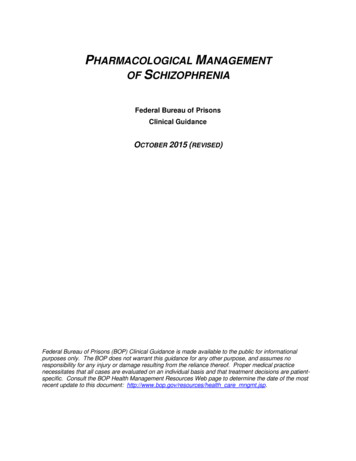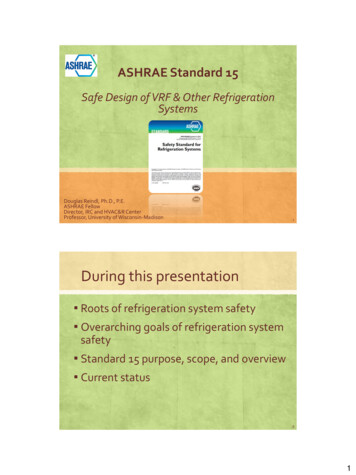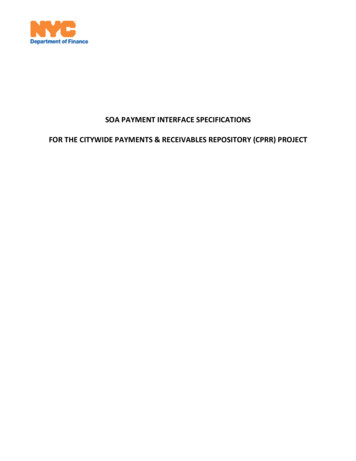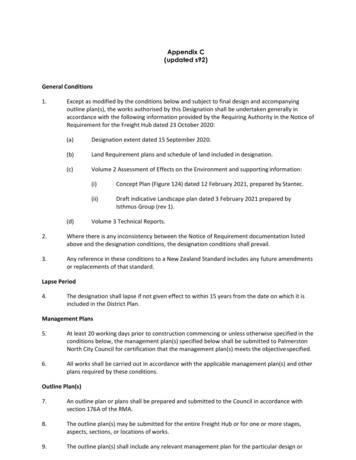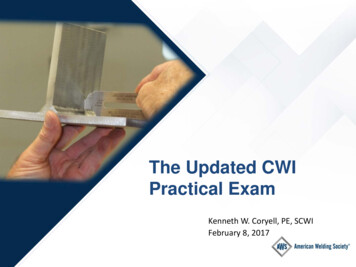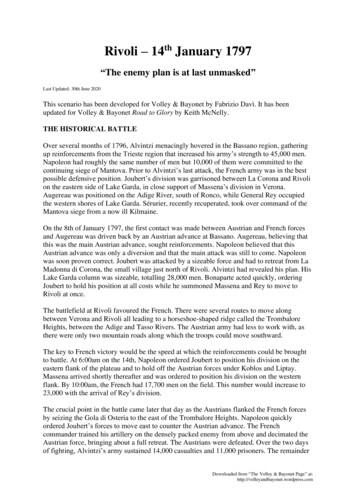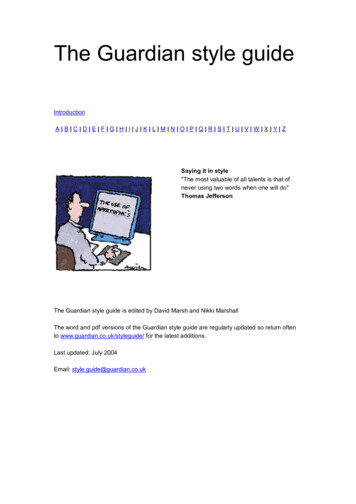
Transcription
Updated 1/15/13
1Table of ContentsIntroduction . 3About Us . 4What is Magoosh? . 4Featured in . 4Why Our Students Love Us . 5How to Use Vocabulary Lists . 7Timmy’s Vocabulary Lists . 7Shirley’s Vocabulary Lists . 7Timmy’s Triumph . 8Takeway. 8Making Words Stick: Memorizing GRE Vocabulary. 9Come up with Clever (and Wacky) Associations . 9Use It or Lose It . 9Do Not Bite Off More Than You Can Chew . 10Read to be Surprised . 10Takeaways . 10Most Common GRE Words . 11Top 10 GRE Words of 2012 . 11Top 5 Basic GRE Words . 13Common Words that Students Always Get Wrong . 14Tricky “Easy” GRE Words with Multiple Meanings . 16Commonly Confused Sets . 22Interesting (and International) Word Origins . 26Around the World . 26French Words. 29Eponyms. 31Words with Strange Origins . 36Themed Lists . 38People You Wouldn’t Want To Meet . 40Vocab from Within . 38Religious Words . 41Words from Political Scandals . 44Money Matters: How Much Can You Spend? . 46Money Matters: Can’t Spend it Fast Enough . 48Money Matters: A Helping (or Thieving!) Hand . 49Vocabulary from up on High . 51Suggestions for this eBook?Leave us a comment here: tp://gre.magoosh.com/
2Preposterous Prepositions . 52Them’s Fighting Words . 53Animal Mnemonics . 55Webster’s Favorites . 57“Occupy” Vocabulary . 58Compound Words . 60Halloween Vocabulary . 62Talkative Words. 64By the Letter . 65A-Words . 65Ambiguous . 66C-Words . 67F-Words . 69Vicious Pairs of V’s . 70“X” words . 72High-Difficulty Words . 74Negation Words: Misleading Roots . 74Difficult Words that the GRE Loves to Use . 76Re- Doesn’t Always Mean Again . 79GRE Vocabulary Books: Recommended Fiction and Non-Fiction. 80The Best American Series . 80The Classics. 81Takeaway . 81Vocabulary in Context: Articles from Magazines and Newspapers . 82The Atlantic Monthly . 82The New Yorker . 83New York Times Book Review . 84The New York Times . 85Practice Questions . 86Sentence Equivalence. 86Text Completion . 87Reading Comprehension . 88GRE Vocabulary: Free Resources on the Internet . 89Suggestions for this eBook?Leave us a comment here: tp://gre.magoosh.com/
3IntroductionThis eBook is a compilation of the most popular Revised GRE vocabulary word list posts from theMagoosh GRE blog. We’ve found that students learn vocabulary best when the words are presented in afun, creative, and intelligent way: we’ve done our best to assemble interesting lists to help you absorbthe words in a way that will stick with you so that you’re as prepared as possible on the day of yourexam.You’ll see that these lists definitely don’t look like your typical, dry GRE word lists, and it’s because wewant you to learn vocabulary words in context—the new GRE’s Sentence Equivalence questions, TextCompletions, and even the Reading Comprehension passages are testing knowledge of words in contextand proper usage, so rote memorization of words and definitions won’t be of much help!If you’re new to the Revised GRE and want to know more about the exam in general, check out “AComplete Guide to the Revised GRE”: http://magoosh.com/gre/gre-ebook for more information.We have some general tips and strategies about how to best use the lists in this eBook (as well as somewarnings about types of studying methods to avoid!) so be sure to read our “How to Use GRE VocabularyLists” and “Making Words Stick: Memorizing GRE Vocabulary” sections before you begin. At the end, wealso have some recommendations for other great reading material that will help you pick up vocabularywords in a fun way to have productive “study breaks”.We hope you find the material helpful! If you have any questions, comments or suggestions, leave us acomment at uggestions for this eBook?Leave us a comment here: tp://gre.magoosh.com/
4About UsWhat is Magoosh?Magoosh is online GRE Prep that offers: Over 200 Math, Verbal, and AWA lesson videos, that’s over 20 hours of video!Over 900 Math and Verbal practice questions, with video explanations after every questionMaterial created by expert tutors who have in-depth knowledge of the GREE-mail support from our expert tutorsCustomizable practice sessions and mock testsPersonalized statistics based on performanceAccess anytime, anywhere from an internet-connected deviceFeatured inSuggestions for this eBook?Leave us a comment here: tp://gre.magoosh.com/
5Why Our Students Love UsThese are survey responses sent to us by students after they took the GRE. All of these students andthousands more have used the Magoosh GRE prep course to improve their scores:Suggestions for this eBook?Leave us a comment here: tp://gre.magoosh.com/
6Suggestions for this eBook?Leave us a comment here: tp://gre.magoosh.com/
7How to Use Vocabulary ListsHere, I’m going to answer the question, “What’s the best way to use a vocabulary word list for theRevised GRE?”. Wait a second, you’re probably thinking. Don’t you just read the list? Actually, readingthrough a vocabulary list is the last thing you want to do. In fact, I tell this to my GRE students with amenacing, authoritarian tone, because I know how easy it is to fall into the temptation of going up anddown a list, covering the definition with your hand, and then coughing up the definition. Again (mybrow is knitted)- do not do this.So, what does this injunction mean then? Burn your vocab lists? Use telepathy, or worse pay 200dollars for that vocabulary software that promises instant recall after one listen? Actually, no. A vocablist can be useful, if used wisely.To illustrate let’s take two of my former students (I’ll obviously change the names) in a GRE class Itaught. One was a vocab juggernaut, the other struggled and struggled and then finally got it. Why?Because he changed the way he learned vocabulary.Timmy’s Vocabulary Lists“I’m bad at learning words.” This was Timmy’s common refrain. I would talk to him about the power ofmnemonics and word grouping. He would look hopeful for a moment but then horrifically bomb thefollowing vocab test. “I’m bad at learning words” inevitably following each 2/25 score (the class had tostudy 25 words a day and the daily quizzes were cumulative).I pulled Timmy aside after a week of his abysmal performance and asked him the simple question,“How are you studying vocabulary?” He shrugged his shoulders and gave the not very helpful response,“I just kind of study.” I prodded him further, “Well, I read the list and cover it up.” He went on to tellme he usually did this about fifteen minutes before class. “It’s always worked for me before, I usuallypass classes memorizing stuff like this.”But my boot camp wasn’t just memorizing stuff – it was a grueling vocab experience that requiredstudents to retain thousands of words for when they take the actual exam – not for when they take ashort in-class quiz. So, I worked with Timmy to help him become more like Shirley.Shirley’s Vocabulary ListsShirley aced every quiz, and could spout out a trio of synonyms for almost any word, sometimesthrowing in a clever mnemonic. We probably all had a Shirley in our classes and assumed she (or he) isnaturally gifted. While that may be the case, more often than not, it is the method, not the person.Shirley would review words shortly after class. She said she would usually learn about five words at atime, consulting the list only so she could remember those words. Then, she would go about her day,Suggestions for this eBook?Leave us a comment here: tp://gre.magoosh.com/
8intermittently, thinking back to those five words. Sometimes, she would totally draw a blank on adefinition and would have to go back to list, “Oh yes, of course, ‘desultory’ means rambling.”In this fashion she would work through the 25 daily words, moving on to another five words every fewhours. When possible she would try to use these words to describe something in her everyday life.Basically, the words were always floating around in her head. Just as importantly, she would make sureto revisit the first half of the list throughout the day instead of simply trying to reach the 25th word.Unlike Timmy, she didn’t hover over the list, covering up the definition. Timmy’s method neverallowed him to turn a short-term memory into a long-term memory, much the way we can memorize aphone number only long enough to call that number. As soon as we’ve done so, the memory vanishes.Finally, Shirley would turn to flashcards when she had to study for the 1,000-word vocabulary final (Itold you my bootcamp was grueling!). Because the words were already in her long-term memory, theflashcards helped her maintain those neural connections. She wasn’t using the flashcards for the initialstep of taking a short-term memory and changing it into a long-term memory. She worked with a fewwords at a time getting them into long-term memory before moving on to new words.Remember that the Revised GRE is a test that requires a cumulative knowledge, not a crammer’s lastminute effort.Timmy’s TriumphFor Timmy it wasn’t easy going at first. He wanted to revert back to his old method, but through hardwork, on both our parts, he soon became more like Shirley. By the end of the bootcamp he was scoringclose to 25 out of 25.So next time you are tempted to cover up a list, remember Timmy (and my menacing brow).TakewayLearning words from a laundry list of vocabulary by covering up the answer and “testing yourself” turnsoff your brain.To move words from short-term memory to long-term memory, bite off a little at a time, and do yourlearning away from the list-- meaning, think back on the words and definitions. Then if you forget them,consult the list. For the collection of lists in this eBook, be sure to learn from Timmy’s mistakes andapply Shirley’s method from the start!Suggestions for this eBook?Leave us a comment here: tp://gre.magoosh.com/
9Making Words Stick: Memorizing GRE VocabularyCome up with Clever (and Wacky) AssociationsAnother way of saying this: use mnemonics. A mnemonic is a creative way of remembering a word.Let’s take the words gregarious and amiable. Gregarious means sociable. Say I have a friend namedGreg, and, indeed, he is outgoing. Now I have a way of remembering this word. As luck would have it, Ialso have a friend named Amy who, believe it or not, is friendly. So now, when I see amiable I thinkAmy-able and for gregarious I think Greg-arious.“Wait a second”, you may be thinking. “I don’t know anybody who has those names!” But here’s thebeauty of mnemonics-– they only need to make sense to you.Granted, the words above didn’t have very interesting mnemonics. And, if you notice in the caption, Imentioned the word wacky. The wackier and sillier a mnemonic, the more likely you are to rememberit. And the mnemonics that make the most sense to you are usually the ones that you come up withyour own.So, give it a try with the following words:Esoteric – known only to those with specialized knowledgeDilatory – slow; delayingPolemic – a written or verbal attack against someoneUse It or Lose ItLet’s say you don’t know the definitions of any of the words above. So, you look them up in a dictionary.Being the good word detective you are, you write down the definitions, as well as an example sentenceon a flashcard.However, tomorrow, your friend asks you what you learned on Magoosh. You tell them that you learnedhow to use mnemonics for three words. You remember the words, but you can’t remember thedefinitions. Now, let’s say that you decided after reading my posts to read an article from The NewYorker. While reading the article you think to yourself, “Hey this is some pretty .oh, oh what’s thatword esoteric stuff”.Now, what’s happened? Well, you’ve recalled a word and used it in a relevant context. Calling forth aword in this fashion will embed it deeper into your memory. That way, when it comes time for the test,you will spend very little brainpower processing the word.Suggestions for this eBook?Leave us a comment here: tp://gre.magoosh.com/
10So, whether you are walking down the street, or even watching a television show, see if you can applythe words you learnt that day (or even the previous days). If you think that GRE prep ends as soon asyou put down your vocabulary books, then you will have a tougher time learning words. Use words(even if discreetly to yourself) whenever you can. Your verbal score will thank you.Do Not Bite Off More Than You Can ChewLearning hundreds of words while only having a tenuous grasp of them is not efficacious. There isbasically a word for this method: cramming.Instead, learn words, but at a rate where they are not falling out of your head. For some, this rate isfive words a day. For others, it’s twenty-five. My experience is that students fare best when they startwith a few words per day, but then increase the number. Oftentimes, your brain simply needs to adaptto something it is not used to doing, i.e. learning vocabulary.Read to Be SurprisedIn the sections following the word lists, I’ll discuss, ad nauseam, the importance of reading. I’ll alsoreference magazines such as The New Yorker, which is filled with vocabulary words used in astylistically advanced context. Beyond context, there is another reason why we should read inconjunction with learning vocabulary.Imagine that you pick up the copy of The Economist (we’ll give The New Yorker a rest for now). Inthere, you see the word dilatory. Look familiar? Well, your brain should have a sudden jolt ofrecognition: we just saw the word in the mnemonics exercise above. Now that you’ve encountered aword you learnt as part of your word list, but weren’t necessarily expecting to see in The Economist,your brain is suddenly more likely to retain it.As you continue to learn words, and as you continue to read, you will have more of these moments ofepiphany. Sometimes, you won’t remember the word immediately, but you can always look the word upto reinforce the definition.Takeaways Use words and use them oftenFind creative and wacky ways to remember wordsRead, read, and read some moreKeep these key points in mind as you go through the lists below. Enjoy!Suggestions for this eBook?Leave us a comment here: tp://gre.magoosh.com/
11Most Common GRE WordsTop 10 GRE Words of 2012AlacrityThe GRE has a predilection for words that don’t really sound like what they mean. Alacrity is noexception. Many think the word has a negative connotation. Alacrity, however, means an eagerwillingness to do something.So imagine the first day at a job that you’ve worked really hard to get. How are you going to completethe tasks assigned to you? With alacrity, of course.An interesting correlation: the more alacritous (adjective form) you are when you’re learning GREvocabulary, the better you will do.ProsaicProsaic conjures up a beautiful mosaic for some. For others, the pro- is clearly positive. So if somebodyor something is prosaic, it must surely be good.Once again the GRE confounds expectations. Prosaic means dull and lacking imagination. It can be usedto describe plans, life, language, or just about anything inanimate that has become dull (it is not usedto describe people).A good mnemonic: prose is the opposite of poetry. And where poetry, ideally, bursts force withimagination, prose (think of text-book writing), lacks imagination. Hence, prose-aic.VeracityVeracity sounds a lot like voracity. Whereas many know voracity means full of hunger (the adjectiveform voracious is more common), few know veracity. Unfortunately, many confuse the two on the test.Veracity means truthful. The adjective form, veracious, sounds a lot like voracious. So be careful.PaucityPaucity is a lack of something. In honor of paucity, this entry will have a paucity of words.Suggestions for this eBook?Leave us a comment here: tp://gre.magoosh.com/
12MaintainThe second definition of this word – and one the new GRE favors – is to assert. One can maintain theirinnocence. A scientist can maintain that a recent finding support her theory. The latter context is theone you’ll encounter on the GRE.ContriteWord roots are often misleading. This word does not mean with triteness (con- meaning with). To becontrite is to feel remorse.LaconicAnother word that sounds different from what it means. A person is described as laconic when he/shesays very few words.I’m usually reminded of John Wayne, the quintessential cowboy, who, with a gravely intonation,muttered few words. As this allusion betrays may age more than anything else, think of Christian Balein Batman.PugnaciousMuch like a pug dog, which aggressively yaps at things near it, a person who is pugnacious likes toaggressively argue about everything. Verbally combative is another good way to describe pugnacious.DisparateIf two things are fundamentally different, they are disparate. For instance, verbal skills and math skillsare disparate, and as such are usually tested separately, the GRE being no exception.Egregious‘Greg’ is the Latin root for flock. At one point egregious meant standing out of the flock a positive way.This definition went out of vogue sometime in the 16th century, after which time egregious was usedironically.Thus for the last five hundred years, ‘egregious’ meant standing out in a bad way. In sports, anegregious foul would be called on a player who slugged another player (not including hockey, of course).Suggestions for this eBook?Leave us a comment here: tp://gre.magoosh.com/
13Top 5 Basic GRE WordsInnocuousSomething innocuous is harmless and doesn’t produce any ill effects. Many germs are innocuous. As aremost bug bites. Even television, in small doses, is typically innocuous. Innocuous can also meaninoffensive. An innocuous question is unlikely to upset anyone.Everyone found Nancy’s banter innocuous-– except for Mike, who felt like she was intentionally pickingon him.CandidA straightforward and honest look at something is a candid one. Many great photographers have createdenduring work because they turn their respective lens on what is real. Whether these photos are fromthe Dust Bowl, the Vietnam War, or on the Arab Winter, they move us because they reveal how peoplefelt at a certain moment.A person can also be candid if they are being honest and straightforward with you.Even with a perfect stranger, he was candid and would rarely hold anything back.ErraticUnpredictable, often wildly so, erratic is reserved for pretty extreme cases. An athlete who scores thewinning point one game, and then botches numerous opportunities. The stock market. And your sleep,especially if your stocks aren’t doing well, can become erratic.Erratic can also mean strange and unconventional. Someone may be known for their erratic behavior.Regardless of which meaning you are employing, you should not be erratic in your GRE prep.BleakIf one has a very depressing take on life, we say that person has a bleak outlook. Landscapes can bebleak (Siberia in April, the Texas of No Country for Old Men), and writers, too (Dostoevsky, Orwell).ProfuseIf something literally pours out in abundance we say it is profuse. This pouring is usually figurative. Aperson who apologies ceaselessly does so profusely. Perhaps a little more vividly, certain men who failto button up their shirts all the way, let the world – perhaps not unwittingly – know of their profusechest hair (which, on their part, should necessitate a profuse apology).Suggestions for this eBook?Leave us a comment here: tp://gre.magoosh.com/
14Common Words that Students Always Get WrongExtantMany think this word means extinct. Extant is actually the opposite of extinct.Despite many bookstores closing, experts predict that some form of book dealing will still be extantgenerations from now.A great mnemonic is to put the word ‘is’ between the ‘x’ and the ‘t’ in extant. This gives you existant(don’t mind the misspelling).ContentiousThis GRE word does not mean content, as you could have probably guessed. It comes from the wordcontend, which means to argue. If you are contentious, you like to argue.Contentious is a very common GRE word, so unless you want me to become contentious, memorize itnow!AuspiciousThis word sounds very sinister. Auspicious is actually the opposite and means favorable.Despite an auspicious beginning, Mike’s road trip became a series of mishaps, and he was soonstranded and broke next to his wrecked automobile.The opposite, inauspicious, is also common on the GRE.EnervateMost people think this words means to energize. It actually means to sap the energy from.John preferred to avoid equatorial countries; the intense sun would always leave him enervated afterhe’d spent the day sightseeing.EquivocatePeople tend to think that equivocate has to do with equal. It actually means to speak vaguely, usuallywith the intention to mislead or deceive. The related word unequivocal also can be confusing. To statesomething unequivocally is to state it in such a way that there is no room for doubt.Suggestions for this eBook?Leave us a comment here: tp://gre.magoosh.com/
15AmbivalentStudents often believe that to be ambivalent towards something is to be indifferent. The truth is almostthe opposite. See, when you are ambivalent you have mixed or conflicting emotions about something.Imagine somebody asked you how it was studying for the GRE.You could say, “I am ambivalent about studying for the GRE because it ate up a lot of time. On the plusside, I did learn many words and improved my reading comprehension.”SedulousI am not quite sure why students can never seem to remember the definition for this word. Perhaps thesed- reminds them of sitting and being idle. To be sedulous, however, is to be anything but idle. If youare sedulously studying for the GRE, you are studying diligently and carefully—making flashcards,writing down important words and formulas, and, of course, checking out the Magoosh blog every day.Suggestions for this eBook?Leave us a comment here: tp://gre.magoosh.com/
16Tricky “Easy” GRE Words with Multiple MeaningsStemTo stem means to hold back or limit the flow or growth of something. You can stem bleeding, you (canattempt to) stem the tide. Do not stem the flow of vocabulary coursing through your brains. Make sureto use these words whenever you can.To stem the tide of applications, the prestigious Ivy requires that each applicant score at least 330 onthe Revised GRE.BlinkeredIf you blink a lot you are likely to miss something. Indeed, your view would be very limited. Extendingthis meaning, we get the definition of blinkered: means to have a limited outlook or understanding.In gambling, the addict is easily blinkered by past successes and/or past failures, forgetting that theoutcome of any one game is independent of the games that preceded it.CheckTo check something is to stop its growth (similar to stem but with more of a focus on growth than flow).If something is left unchecked, then it grows freely.Deserted for s
thousands more have used the Magoosh GRE prep course to improve their scores: 6 . (I’ll obviously change the names) in a GRE class I taught. One was a vocab juggernaut, the othe
